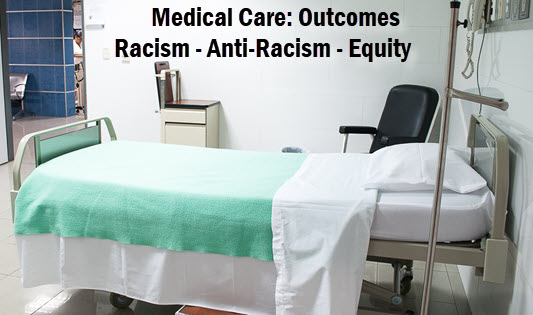Equity: What Does Anti-Racism Mean for Your Medical Care?
Posted March 29, 2021 09:45 am | Op-Ed

Photo: Martha Dominguez de Gouveia -
Unsplash | Columbia County Observer graphic
According to the American Medical Association (AMA), the most important public health concern is systemic racism. We should turn away patients requesting early at-home treatment for COVID ("not enough evidence of effectiveness") and focus on uprooting the racism that is assumed to lurk in the subconscious of every white person and to cause "health disparities."
With COVID, people of color do worse. Is it delayed treatment because of racial discrimination? Delayed treatment for everybody and silence on preventive measures except for vaccines is the AMA's official policy. There is plenty of evidence that vitamin D deficiency is a key factor in poor outcomes. Darker-skinned people need more sun exposure to make adequate vitamin D and are even more likely to be deficient. The AMA talks about "white privilege," but not about vitamin D supplements.
The AMA’s desired result—equity—is apparently health outcomes proportional to a group’s representation in the population. Overall, or for certain groups, the “equitable” outcomes could be better or worse.
The disparate outcomes correlated with race and ethnicity also correlate with income, obesity, diet, family structure, drug use, and personal responsibility about health.
Will we have better outcomes or more equitable ones if we change attitudes and shift resources away from higher socioeconomic and healthier groups into underserved groups? In the days of "evidence-based medicine," we have no evidence.
We measure what is easy to measure and change what is easy to change. Institutions are appointing equity and diversity officers and changing the composition of the workforce. Medical schools celebrate the "diversity" of the entering class. This is a zero-sum game, not an expansion of opportunities, and one obvious feature is a greatly reduced number of white males.
Less obvious is the change in admissions requirements and correspondingly in the curriculum. Courses like calculus and organic chemistry are being eliminated. The entrance examination (the MCAT) now emphasizes politically correct attitudes, not just knowledge.
The old pre-med was recognized for being a drudge—i.e., for having a strong work ethic. This sort of person could tolerate brutally long hours in the laboratory, lecture hall, hospital wards, clinic, and operating room. Now, work hours are limited. And who needs a person with some knowledge of chemistry or the intelligence to comprehend it when treatment plans are chosen from drop-down menus? The new medical student is awake and computer-adept. Will patients be better off?
The AMA’s anti-racism campaign demands atonement and reparations. Its history is rife with outright discrimination. Its highly honored founder Nathan Davis excluded blacks and women from the AMA House of Delegates. Its still highly esteemed dignitary Thomas Huxley expressed an opinion, in 1871, about “the average Negro” that I dare not repeat. The acclaimed 1910 Flexner Report resulted in closing most black medical schools when other medical schools declined to admit black students.
JAMA recently forced deputy editor Howard Livingstone, “who is White,” to resign because of a podcast. He questioned the concept of systemic racism and said that many were offended by the assumption that they are racist. Being "not a racist" is insufficient—one must be "anti-racist," obsessed with race and identity politics.
The same type of logic caused the purging of some books by the progressive Dr. Seuss—one of the first people to fight against racism—because of some possibly offensive cartoons. His desire was for race neutrality: He wrote about how the Plain-belly and the Star-belly Sneetches learned to accept each other.
Civil rights activists such as Martin Luther King also advocated color blindness. Would he be canceled today too?
People want their doctor to focus on their problems and on doing what is best to help them. They would probably like their doctor to study the latest diagnostic and therapeutic developments instead of attending a struggle session where he is expected to confess his guilt about "white privilege."
Most Americans—probably all of those who are patients—are concerned about their own and their family's health, not about statistical outcomes by race. They are likely not willing to have their health sacrificed to improve some politically designated disadvantaged group's health hypothetically.
Are white Americans who feel this way racist? Will doctors who put their patients first be canceled in favor of "anti-racists" who divide society into "victims" and "oppressors" and redistribute care accordingly?
---------------------------
Jane M. Orient, M.D. obtained her undergraduate degrees in chemistry and mathematics from the University of Arizona in Tucson, and her M.D. from Columbia University College of Physicians and Surgeons in 1974. She completed an internal medicine residency at Parkland Memorial Hospital and University of Arizona Affiliated Hospitals and then became an Instructor at the University of Arizona College of Medicine and a staff physician at the Tucson Veterans Administration Hospital. She has been in solo private practice since 1981 and has served as Executive Director of the Association of American Physicians and Surgeons (AAPS) since 1989.

 By Jane M. Orient, M.D.
By Jane M. Orient, M.D.